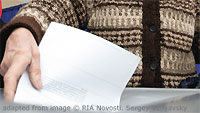Putin Loyalists Assert Control in Russian Regional Elections

(Bloomberg – bloomberg.com – Ilya Arkhipov – October 15, 2012) Russian President Vladimir Putin’s allies dominated Russia’s first gubernatorial elections in eight years that opposition parties said were marred by abuses.
The ruling United Russia party’s candidates won all five races for governor and six local legislative contests, according to preliminary results announced today by officials from local election commissions on state television channel Rossiya 24. Voter turnout was low, dipping below 8 percent in the Primorsky region on the country’s Pacific coast.
The election was the first major electoral test for Putin since he reclaimed the presidency in May and thousands of protesters took to the streets following a December parliamentary ballot the opposition said was rigged. The Kremlin winnowed the contenders in gubernatorial elections by using a so-called municipal filter to screen candidates, while the heads of at least 20 of Russia’s 83 regions were replaced or reappointed before legislative changes went into effect.
“United Russia’s success was determined from the beginning by the character of the election itself,” said Igor Bunin, head of the Center for Political Technology in Moscow. “At the level of local legislative elections, spoilers and decoy candidates were used to drain some of the votes.”
Russian equities, which have the lowest valuations based on projected earnings among 21 emerging markets tracked by Bloomberg, advanced, with the Micex Index gaining 0.6 percent to 1,454.29 at 2:40 p.m. in Moscow. The ruble-denominated benchmark gauge trades at 5.5 times estimated earnings after gaining 3.7 percent this year.
Anti-Putin Unrest
Unrest after parliamentary and presidential balloting in December and March forced the ruling party into a balancing act to avoid a heavy-handed show of strength sparking a new wave of protests and rallying the opposition. The vote was “civilized” and “no significant violations have yet been spotted,” Prime Minister Dmitry Medvedev, who took over the chairmanship of United Russia from Putin a year ago, said in televised remarks last night.
Countering official claims, opposition parties including Just Russia and RPR-Parnas Party complained about irregularities and abuses. Vladimir Ryzhkov, a former lawmaker and leader of Parnas, said his party’s vote observers detected “hundreds of grave violations” during elections in the southern Siberian city of Barnaul.
Incumbents Win
Governing-party candidates led by double-digit margins in the five gubernatorial races, polling more than 50 percent to win the election in the first round, according to the results announced today.
Amursk region Governor Oleg Kozhemyako won 77.3 percent of the vote, according to the commission. In Belgorod, Governor Yevgeny Savchenko got 77.6 percent and in Novgorod Sergey Mitin, the incumbent, received 76 percent. In Ryazan, Governor Oleg Kovalyov won 64.4 percent of the vote, while his Bryansk colleague Nikolai Denin received 65.2 percent.
Putin abolished direct elections of governors in 2004 and agreed to restore them last year after tens of thousands took to the streets to protest voting fraud.
The president has struggled to reverse a slump in approval ratings that are near the lowest level since mass protests broke out in December. A crackdown has since ensued, including prosecution of opposition activists and leaders, increased fines for unsanctioned rallies and tightened controls over the Internet.
Missed Chance
“The Kremlin lost a chance to show a willingness to allow for soft democratization,” said Grigory Melkonyants, head of Golos, a vote-monitoring watchdog. “We see almost as many violations and as much administrative pressure during the election campaign as before.”
The system of screening candidates includes a requirement to collect the signatures of as many as 10 percent of municipal lawmakers in the region. Most regional parliaments are controlled by United Russia and will decide individually whether independent candidates are allowed to run.
Support for Putin is at 44 percent, after bottoming out at 41 percent last month, the Moscow-based Public Opinion Foundation, or FOM, said in an Oct. 11 report. The Russian leader won the March presidential election with 64 percent of the vote. FOM polled 3,000 Russians Oct. 6-7. No margin of error was given.
Slowing Growth
The world’s biggest energy exporter is facing slowing growth after inflation accelerated to a 10-month high in September and consumer confidence fell in the third quarter for the first time since January-March 2011.
The World Bank on Oct. 8 cut its forecasts for Russia’s economic expansion this year and next, citing the country’s weak harvest, the global economic turmoil and faster price growth eroding purchasing power.
“A split in the elites is growing,” said Vladimir Mekhedov, a political scientist at Bryansk State University. “It may not be that distinct yet, but the discord is making itself felt, it’s hard to constrain it.”
